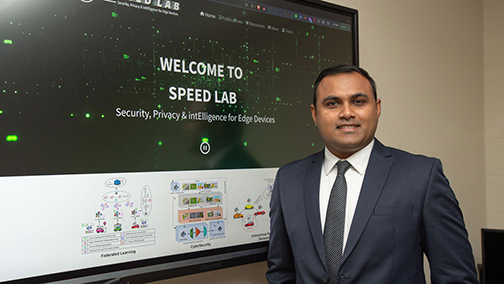by Tim Crosby
CARBONDALE, Ill. – Even as artificial intelligence rises as a new technology, a Southern Illinois University Carbondale researcher is looking at how, when it comes to crime, some things never change.

Ahmed Imteaj, assistant professor in the School of Computing, in January will start work on a project titled “Education and Workforce Training for Artificial Intelligence in Criminal Activity Recognition: Computing and Criminology Perspectives.” The one-year project is funded with a nearly $100,000 grant from the U.S. Department of Homeland Security under its Criminal Investigations and Network Analysis Center program. (Photo by Russell Bailey)
Ahmed Imteaj, assistant professor in the School of Computing, in January will start work on a project titled “Education and Workforce Training for Artificial Intelligence in Criminal Activity Recognition: Computing and Criminology Perspectives.” The one-year project is funded with a nearly $100,000 grant from the U.S. Department of Homeland Security under its Criminal Investigations and Network Analysis Center program.
Imteaj’s work will explore how criminals might use burgeoning AI technology for nefarious purposes and how law enforcement might use it to detect and combat criminal behavior. The state-of-the-art training he intends to create is urgently needed, with AI becoming an ever-more common presence in the world. His work will develop educational modules and certificate programs covering topics related to analytics, computer vision and integrating criminology perspectives into AI investigations.
“The objective is to equip students, practitioners and law enforcement personnel with the knowledge and skills required to comprehend and confront AI-enabled criminal activities,” Imteaj said. “By leveraging technologies like GIS crime mapping and computer vision, law enforcement will be able to predict crime patterns and trends more effectively, ultimately enhancing public safety.”
A broad perspective
Imteaj said there is a need for a comprehensive understanding of AI’s potential in both criminal activities and crime prevention. Workforce educators will be able to integrate the educational modules he is building into related courses. His proposal also includes inviting expert speakers to provide real-world insights and use cases.
“The ultimate goal of the proposal is to narrow the gap in educating professionals and students in AI-based cybercriminal activities and their prevention mechanisms,” Imteaj said. “We want to foster a workforce that is well-prepared to address emerging threats, leverage AI for crime detection, and ensure the safety and security of communities.”
Two-pronged approach
The proposal will delve into how people might use common AI devices, such as chatbots, to do things such as spread misinformation and automated threats on social media or to conduct AI-assisted stalking. By gaining this understanding, law enforcement and security professionals can stay ahead of cybercriminal tactics and develop strategies to counteract them.
On the other side of the equation, Imteaj’s work will help empower law enforcement to predict, identify and respond to criminal activities more effectively. For instance, the research will explore the use of AI in analyzing video data, text or speech data, and geographic information systems crime mapping data to uncover patterns, trends and anomalies that could signify criminal behavior. This proactive approach would enable law enforcement to allocate resources efficiently and mitigate threats before they happen.
“Overall, our work bridges the gap between technological advancements and law enforcement practices,” Imteaj said. “By providing education, training and resources, we will empower law enforcement personnel, students and practitioners to understand the potential risks associated with AI-driven criminal activities and equip them with the tools needed to address these challenges.”
Grant pays for many aspects
The grant will pay for the salaries, stipends and benefits of project team members, including researchers, educators, mentors and experts from different disciplines contributing to the work. It also will pay for educational modules, curricula, course materials and other resources related to AI for criminal activity recognition.
Other aspects of the grant will pay for developing and promoting certificate programs offering specialized training and education in the field of AI and criminal activities, including curriculum development, program administration and marketing efforts. It also can support collaborations with external partners, law enforcement agencies and other organizations contributing to the project’s success, including guest speakers, industry experts and training providers.
